
How drinking pints led to Brexit. Getting Britain to vote Leave.
Nigel Farage is often called an alcoholic, a liar and a racist, but how did a guy like that get the UK to vote for Brexit?
Brexit
One of the most prominent arguments of both Nigel Farage and Vote Leave to leave the European Union, was the migrant crisis and border control issue. In his speech, broadcasted by Sky News on the 29th of April 2016, Farage said: “… and the fact that we have refused to shy away from the most imminent and urgent threat and problem that faces this country, namely open door immigration and the security and social implications of it” (Sky News, 2016: 0:53-1:08).
Farage wanted Britain to have control over its own borders, but because Britain was part of the European Union, the migrant and border policy was formed and controlled by the European Union. The current disorder in the world, causing thousands of refugees to flee from their countries, created a big migration stream into European countries. According to statistics of the UN refugee agency (2017), 1.5 million people arrived in Europe by sea in the last three years. Harbouring all these people turned out to be a politically heavily criticized task, as thousands of refugees still arrive in Europe each month. The policy of the European Union includes reducing the incentives for irregular migration, saving lives and securing external borders (European Commission, 2017). All countries in the European Union have to follow this policy and help the people fleeing the warzone by taking care of these people.
As a result of right wing political pressure, several countries started closing their borders to gain insight in who exactly were trying to get in and to prevent illegal migration. Because of this, illegal border crossing, where people without proper authorization cross European borders (EU immigration portal, 2016), became a huge thing. the smuggling of people into countries increased and thousands of fatal accidents took place. In the last four years, over 15.000 people died in their attempt to reach Europe from sea (UNHCR, 2017).
To stop the EU from deciding Britain’s policies, Nigel Farage campaigned for Brexit. Two days before the Brexit referendum, he posted an article on Express.co.uk in which he stated to be concerned for the safety and the future of Britain, as the migrant crisis and terrorist attacks caused a lot of problems in Europe. According to him, the best solution was for Britain to leave the European Union, to free Britain from the strangling policies of Europe, to retrieve its democracy and control of its borders and to embark upon an exciting future as an independent nation (Farage, 2016). By doing so, Britain would not be held back by European limitations (Figure 1); Britain would become a safer place and it would be able to trade freely with other countries (Figure 2).
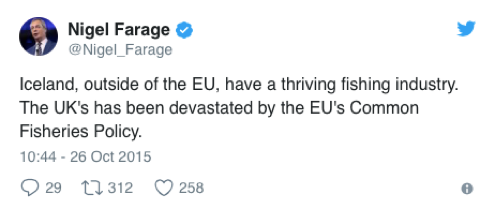
Figure 1. Farage tweets about EU policy limitations
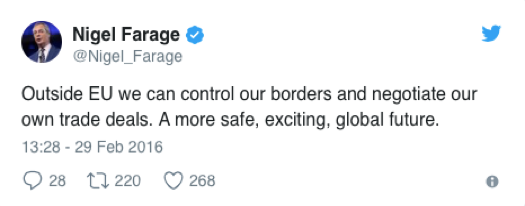
Figure 2. Farage tweets about a 'brighter' future
But how did Farage’s beliefs reach the people, resulting in the decision by the majority of Britain to leave the EU? The answer is: Farage's message, and this article will focus on the role it played in Brexit.
Farage's message
In politics. 'message' is not only about what a person is saying, but about “the politician’s publicly imaginable ‘character’ presented to an electorate, with a biography and a moral profile crated out of issues rendered of interest in the public sphere” (Lempert & Silverstein, 2012: p.1). Farage’s imaginable character, that of a straightforward, criticizing, radical and drinking man from the working class, creates an approachable message of him being the politician who is not afraid to speak his mind (Maly, 2016). In Farage’s mission to free the UK from the EU, he mainly focusses on anti-migration measures and border control, which oftentimes takes radical forms (Figure 3).
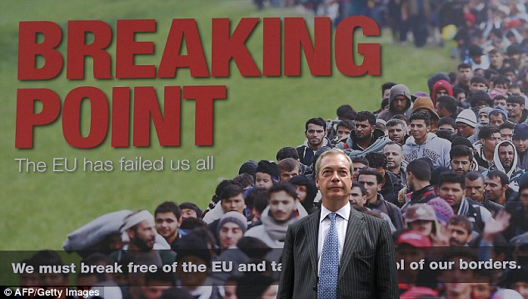
Figure 3. Farage in front of UKIP's controversial campaign poster.
This radical anti-migration nationalistic discourse enables the construction and unification of 'the people' through vagueness and implicit communication (Maly, 2016). It is a form of flexible nationalism to ‘subtly’ utilize racist talk while retaining a certain protection against the label ‘racist’. However, Farage’s straightforward personality oftentimes bypasses the ‘subtle’ form of the claims, as he is indeed often accused of being a racist (Figure 4.) The UKIP campaign poster, seen in Figure 3, was even compared to Nazi propaganda (Figure 5).
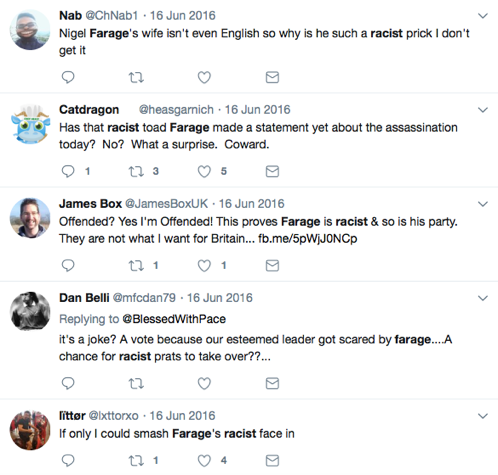
Figure 4. People on Twitter calling Farage racist in response to the release of the UKIP campaign poster.
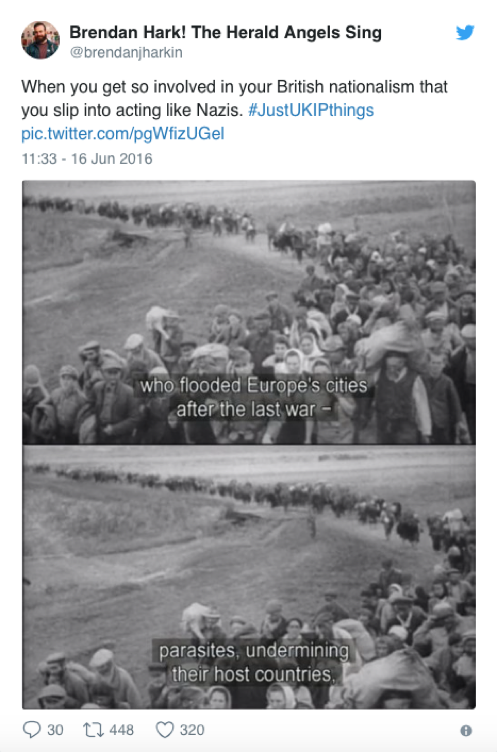
Figure 5. UKIP’s campaign poster being compared to Nazi propaganda from a BBC documentary.
The message of Farage is perceived differently by his followers and by his critics. The approachable character of the drinking guy in the pub speaking his mind creates a feeling of solidarity for the supporters of Farage (Figure 6).
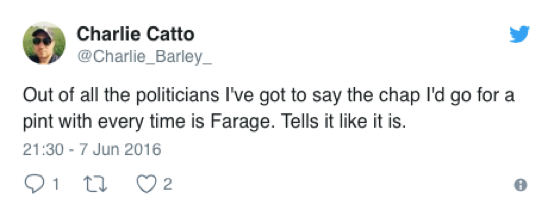
Figure 6. A fan of Farage mentioning he likes to go on a drink with him because he ‘tells it like it is’.
Even adversaries of Farage acknowledge him as the politician who is one of the people of Britain, unlike other politicians who seem distant and formal (Figure 7).
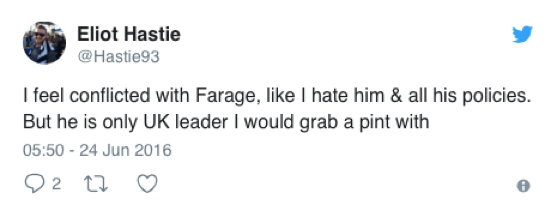
Figure 7. An adversary of Farage tweeting that Farage is the only politician who would be fun to spend time with.
His negative image as an unprofessional racist does not negatively impact his message for his supporters, as Farage is considered the approachable politician who says it as it is, even if ‘it’ turns out to be radical. Even though Farage’s message is acknowledged as him being one of the people, that does not mean all the people are supporting him. While it is true that this message helps Farage reach a lot of people, he is also perceived as unprofessional and unworthy of leading the country by his critics (Figure 8).
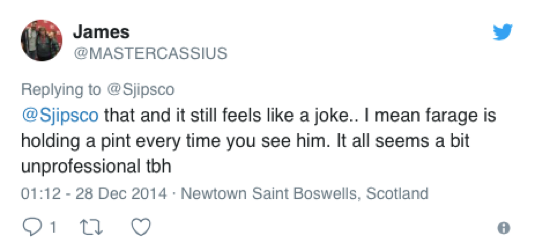
Figure 8. A person on Twitter criticising Farage’s image unworthy of someone representing a country.
UKIP and Vote Leave
The message of the radical ‘average Joe’ Farage contributed to the majority of the UK to vote for Brexit, but he was not alone. Two parties campaigned to leave the EU: Farage’s party, UKIP, and Vote Leave.
Nigel Farage became the leader of the UK Independence Party in September 2006. As the leader of this right-wing party, his voice was heard loud and clear in the European debate. The migration crisis in Europe and the fear for that crisis coming to Britain was the perfect push for anti-Europe parties to make their move. Farage’s message got people interested in his words, explaining the crisis, forecasting problems for Britain and seeing the European Union as a failure. His statements about safety for the citizens by ensuring border control (Figure 9), full democracy for Britain by leaving the European Union (Figure 10) and financial progression for all working people because costs are no longer shared with with all of Europe (Figure 11) added up to the message of the straightforward working class ‘spokesman’. This got through to people and made them believe leaving Europe was the best choice.
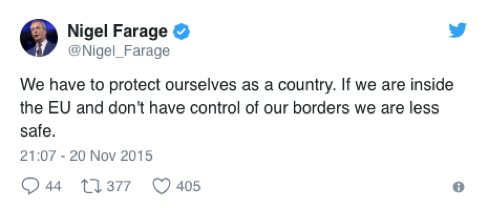
Figure 9. Farage tweets about safety and border control.
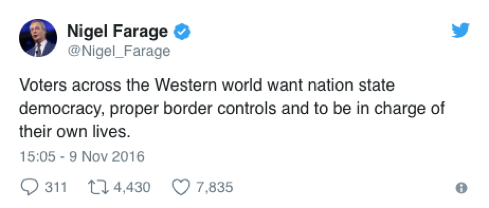
Figure 10. Farage tweets about democracy.
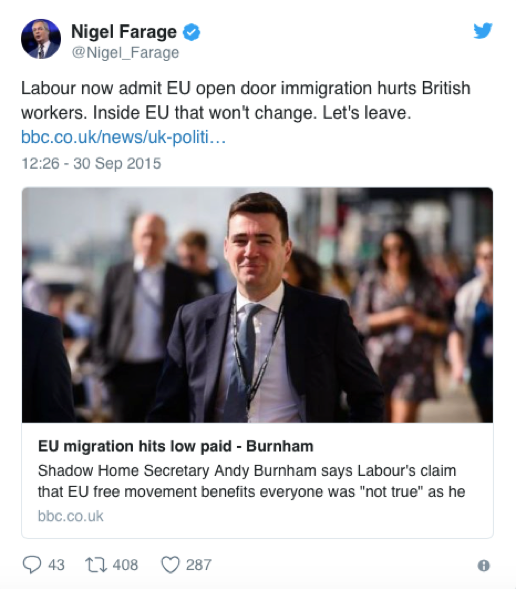
Figure 11. Farage tweets about British wages.
Another movement that was campaigning for Brexit was Vote Leave. Funded by Peter Cruddas and supported by Boris Johnson, the leaving mayor of London, Vote Leave had the same goal as UKIP and Nigel Farage, but their approach was slightly different. Where Nigel Farage stood out with his message of being a straightforward radical drinking guy, who puts a lot of emphasis on mentioning the bad things of being part of Europe, Vote Leave used a gentler approach by aiming to give England back to its rightful people and had a campaign that focussed on the positive, by stating all the advantages for Britain as a result of leaving the European Union (Vote Leave, 2016). For example, Vote Leave would focus on Britain, saying they would be able save £350 million a week to use for their own good, while Farage would never miss out on a chance to criticize the EU, stating the costs of staying in the EU (Figure 12).
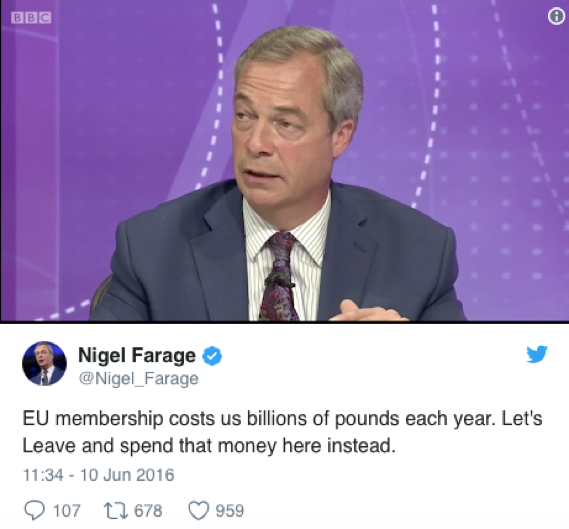
Figure 12. Farage tweets about the costs of EU membership.
Brexit
The call for Brexit origins from 2010. David Cameron, the prime minister at the time, was trying to keep the Eurosceptic backbenchers in the parliament satisfied in his attempt to keep Britain part of the European Union (Mason, 2016). However, the urge for leaving the EU kept on growing as the call for a referendum became stronger. The migration crisis was the biggest cause: Cameron could not keep his promise to bring migration down and he failed again in 2015. The idea grew that Britain was powerless to lower migration from the EU. At first the leave camp focussed on arguments about the economy, but soon found out that immigration was the most resonant message. Facebook campaigning, big data mining and micro targeting became important features in spreading the message to leave the EU (Mullen, 2016). Software with in-built algorithms was used to assign each voter with scores based on how likely they were to vote, and on how likely they were to vote Leave or Remain. The data was then used to create target lists for digital advertising.
The rise of Nigel Farage and UKIP in 2013 was a major factor for Brexit. Farage started to gain millions of votes in the 2015 election. His frequent media appearances and his radical message helped establish the link between immigration and the EU in the public mind. When Johnson and Gove came out for Brexit, it gave a huge boost to the leave campaign. Them entering the stage changed the view of Brexit being a thing of very radical right-wingers. A popular personality like Johnson standing up for Brexit stirred the society into believing there would be a better Britain outside of the EU (Figure 13).
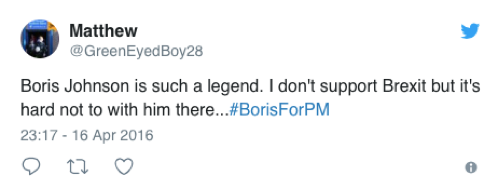
Figure 13. A person on Twitter showing how his opinion on Brexit is influenced by the influence of Johnson.
Conclusion
Nigel Farage is perceived as a straightforward beer-drinking guy from the working class, who says it as it is. This approachable message made it possible for Farage to reach the working class and even some of his adversaries. His critics see him as a lying radical racist, who is unworthy of representing the country. This negative image does not hurt the way his message is perceived by his fans, as they consider being radical as being straightforward and speaking your mind.
His beliefs on border control and financial progression for the working class added up to his message and started to be followed. With the help of his party, the UKIP, and Vote Leave, the other party campaigning to leave the EU, Farage managed to win over more than just ‘radical right-wing Britain’ to vote for Brexit.
References
BBC. (2016). EU Referendum Results.
European Commission. (2017). Priorities: Migration.
EU Immigration portal. (2016). Crossing the EU borders.
Farage, N. (2016). Why we must vote LEAVE in the EU referendum.
Lempert, M., & Silverstein, M. (2012). Creatures of politics.
Maly, I. (2016). Why Trump won.
Mason, R. (2016). How did UK end up voting to leave the European Union?
Mullen, A. (2016). Leave versus Remain: the digital battle.
Sky News. [liarpoliticians2]. (2016, April 29). Nigel Farage speech on immigration and Brexit [Video file].
UNHCR. (2017). Operational Portal Refugee Situations: Mediterranean Situation.
Vote Leave. (2016). Why Vote Leave.